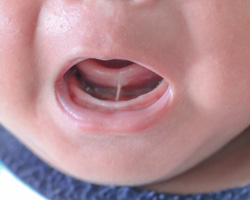Lip and Tongue Tie Treatment--Fort Washington, WA
Setting Your Baby Up for Success

Is breast or bottle-feeding your baby always a struggle? Do they have difficulty latching or creating a steady flow? Do you typically end up frustrated and in pain afterward?
Before you blame yourself, know that these types of problems are telltale signs of lip and tongue tie, conditions that physically prevent your child from using their mouth properly.
Dr. Natalie Gardner has helped many parents and children overcome these conditions with quick screenings and gentle care, and she can do the same for you—just click here to request an appointment and get started.
Why Choose Upper Dublin Pediatric Dentistry for Lip & Tongue Tie Treatment?
- Top-Rated Pediatric Dental Office in Fort Washington
- Led by Board-Certified Pediatric Dentist
- Dentist Who is Also a Mom
What is a Lip/Tongue Tie?

Behind each lip and below the tongue is a thin band of tissue called a frenulum. They help these parts of the mouth move freely and also ensure they are in the correct position during rest. The lip frenulums are attached to the gums and keep them held against the teeth and sealed, assisting with nasal breathing.
The tongue frenulum ensures that it stays on the floor of the mouth and doesn’t obstruct the airway.
A tie is when these frenulums are so short or tight that they prevent the tongue or lips from having their full range of motion.
It’s not clear what causes lip and tongue ties right now, but they tend to develop in the last few weeks of pregnancy, and there seems to be a genetic component (there are many cases of ties running in families).
Why is it Important to Treat Lip & Tongue Ties?

For babies, lip and tongue ties can prevent them from being able to feed properly. On top of causing them to miss out on essential nutrition, they can also make feedings painful, both orally and because the child tends to end up swallowing a lot of air by accident.
Of course, the experience for moms is heartbreaking, plus babies who can’t latch normally tend to gum and bite the nipple during feedings that can end up taking hours.
Looking ahead, children with untreated lip and tongue ties can have problems switching to solid foods, speaking clearly, and can even develop dental issues because the teeth are restricted from coming in as they should.
Lip & Tongue Tie Treatment

Fortunately, for parents and babies struggling with these conditions, our practice can help using a simple 3-step process:
- Step 1: We perform a screening to determine whether a child has a lip or tongue tie.
- Step 2: If they do, we do a procedure called a frenectomy, which involves removing or loosening the offending frenulum.
- Step 3: A straightforward recovery process follows. The baby will be able to feed immediately afterward, and the parent will be given a program of simple stretches so that the oral tissues heal correctly.
Starting in the moments after the frenectomy, the child’s mouth should be able to function normally, and all of the problems listed above should go away fairly quickly (and stay gone).
Lip and Tongue-Tie FAQs
Is my child old enough to get lip or tongue-tie treatment?
One of the great benefits of lip and tongue-tie treatment is that it can be performed on infants. While it’s scary for many parents to think about having their little one undergo such a procedure, it can provide life-changing results. Since there is no age minimum for a frenectomy, you can have it performed just days after your baby is born.
Lip and tongue-ties will not go away on their own, so if you suspect it will be helpful for your child, don’t hesitate to ask a member of our team. The sooner you address the problem, the easier it will be for you and your baby.
How will you keep my baby still for the frenectomy?
When performing a frenectomy on a baby, we will make the process as comfortable and easy as possible. Since little ones enjoy being warm and cozy, a swaddle is often the best option for keeping them still. This eliminates the potential for any wiggling while attempting to release the banded lip or tongue-tie.
You can trust that our team will ensure the comfort and safety of your little one throughout the process as well as return them to you as quickly as possible.
What could happen if my child doesn’t get treatment for a lip or tongue-tie?
If you do not pursue lip or tongue-tie treatment for your child, there is the possibility they could struggle as they get older. For babies, they may be unable to nurse or take a bottle properly, which can lead to poor weight gain. If you have an older child, they may find it hard to eat solid foods or say certain words or sounds, resulting in a lisp. Other potential problems that can arise include poor oral health, sleep apnea, neck pain, shoulder discomfort, and more.
How long does it take to see improvement after a frenectomy?
After our team at Upper Dublin Pediatric Dentistry finishes your child’s frenectomy, you should expect to see a drastic improvement almost instantly. Their range of motion will be more evident, and if it is performed on your baby, you’ll notice they will likely latch correctly the moment you begin to nurse. It is possible, though, for it to take a few feedings for your little one to become accustomed to their new lip or tongue movement.
If your child is older and undergoing a frenectomy, improvements will be seen quickly; however, they may require additional therapy to help relearn certain speech patterns.
